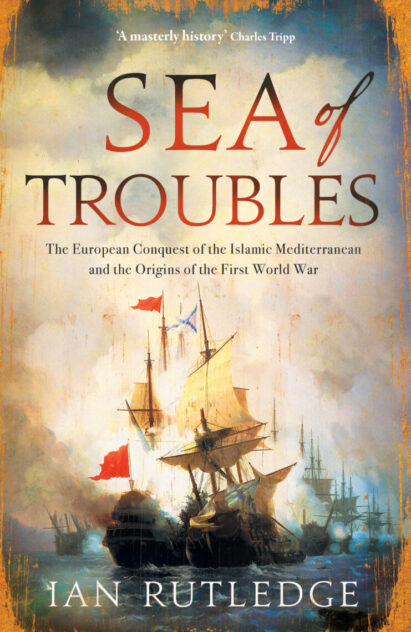This recent book is more than just an interesting history book.
Events in the Mediterranean’s past, and their historic consequences, echo what is occurring in Gaza today, providing perspective.
The Israeli ambassador at the UN recently quoted as far back as 200 BC. These historical quotes from the Bible make some people think their actions derive from ancient times. Some others think that their actions remind them of the Middle Ages.
The Israelis like to quote British and US government actions in the Second World War. But they never quote what was done by the French, British, and Italian governments in the process of the takeover of the North African Arab countries, which just preceded the colonisation of Palestine. Agreements between the victorious imperialist powers, such as the French and British, divided up the area and led to the Balfour Declaration, which followed the end of the war.
The French had taken over Algeria in 1830/35. This was after the failed takeover of Egypt by Napoleon. The French navy, at a time when all the European navies had large numbers in the Mediterranean, stood off the city of Algiers and pounded it into submission. They said they would not take property or carry out other violence, but as soon as the troops arrived, they killed many of the occupants and looted the city. Once they established themselves, there was great opposition from the indigenous peoples. So they moved en masse into any village, killed all the occupants, and destroyed everything.

The British did not intervene because France agreed to keep Egypt out of it. The Ottomans in Istanbul did not, nor did they respond over colonial takeover in Tunisia and then Morocco, because, as the book shows, they were scared of upsetting their alliances. Later on, the Turkish government was hamstrung by heavy debt, mostly owed to the imperialist powers. It also had a much weaker navy at that time.
The similarity with Israel is that the French then moved in colonial settlers to Algeria and took the best land with no compensation. The French got some corrupt leaders to help them, just as the Israelis have used Abbas, the PLO leader today. But such arrangements only last as long as you give concessions, however small.
After reading the book, you can start to think about how the arrangements between the communities in North Africa were destroyed.
Of course, the Ottomans were a form of dictatorship, and they carried out genocide in the case of the Armenians. However, they had a great variety of different religions and nationalities in their territories. These managed to integrate, to some extent, and live together. For example, many of these cities had sizeable Jewish populations, and they often played prominent roles in negotiations with the imperial powers. Jewish people were obviously very hostile to the Spanish because many of them had been driven out and given sanctuary in Ottoman territory.
The book is quite big, so I want to make just a couple of points. Firstly, the positioning of US and British ships off Gaza and in the Red Sea is reminiscent of this history. Secondly, if you look at the deals being negotiated at the international level, each country’s government thinks of their own national interests and not the genocide in Gaza.
When you see how the Arabic Jewish communities in Baghdad, Egypt, and all these North African countries have disappeared, you realise, as Avi Shlaim has said, what a catastrophe the setting up of Israel was. The process of the Nakba, when the Palestinians were forced off their land during the establishment of Israel, has created a huge division in the region.
Most importantly, the rush for territory and control of the seas by the imperialist countries, particularly the route to India for the British, has destroyed the development of countries like Egypt. The use of debts and joint imperial power destroyed the Ottomans.
Today, imperialism, particularly the United States government, provides incredibly expensive weapons systems that can destroy countries with minimal loss to their own forces. Israel is engaged in such an assymmetrical offensive as we write these words.
A lot is covered in this book, and maybe some readers may find the review contentious, but it is important to put the Israeli government’s role in what is happening in Palestine into a wider perspective.
Sea of Troubles – The European Conquest of the Islamic Mediterranean and the Origins of the First World War, 1750–1918 by Ian Rutledge.
Art (53) Book Review (121) Books (114) Capitalism (65) China (79) Climate Emergency (98) Conservative Government (90) Conservative Party (45) COVID-19 (44) Economics (40) EcoSocialism (55) Elections (83) Europe (46) Fascism (56) Film (49) Film Review (68) France (70) Gaza (60) Imperialism (98) Israel (124) Italy (46) Keir Starmer (52) Labour Party (111) Long Read (42) Marxism (48) Palestine (169) pandemic (78) Protest (152) Russia (340) Solidarity (142) Statement (48) Trade Unionism (141) Ukraine (346) United States of America (132) War (368)

